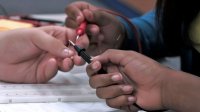Mastery-Based Assessment Builds Accountability
How you can help students take responsibility and meet high expectations by providing the right tools and support along the way.
Your content has been saved!
Go to My Saved Content.MC2 (Metropolitan Cleveland Consortium) STEM High School is a year-round public school in Cleveland, Ohio, where instruction is through interdisciplinary project-based learning, and the focus is on providing students with an integrated curriculum that is informed by real-world experiences.
The school uses a mastery system for assessment (PDF) in grades nine and ten in lieu of the traditional A-F system. This means that students must demonstrate competency at 90 percent or better in order to receive an "M" for mastery on any given benchmark task, and they must achieve mastery in order to receive credit. In setting such a high bar, the system clearly defines expectations and demands top academic performance. However, in requiring that all students meet this bar, it also communicates that the administration believes every student is capable of reaching this standard, and it obligates the school to provide the tools and support for students to succeed.
The school has multiple structures in place to ensure that students can meet the requirements, including trained volunteer tutors from NASA, General Electric Lighting, and local teaching colleges, as well as differentiated instruction (PDF) from the teachers. In math teacher Catherine Staveteig's class, this means that she uses a combination of group projects, individualized learning -- which can include online exercises -- small group sessions, and one-on-one instruction. At the end of each quarter, she has "recovery time," when she may provide alternative assignments to give students different ways to learn and demonstrate their mastery and thereby obtain credits they didn't earn before.
One of the core operating principles at MC2 STEM (PDF) is "Master your own path." The mastery assessment system helps to inculcate this principle because students are expected to take responsibility for meeting the school's expectations. Rubrics are transparent to the students so that they know exactly what is required of them. Teachers provide the instructional support students need and make themselves available for additional help, but students are expected to know their own status and be proactive about seeking what they need, whether from teachers, tutors, or fellow students. As senior Timothy Hatfield explains, "With the mastery system, I am held accountable to do that work and get it turned in."
These kinds of high expectations, along with adequate support structures in place, have been shown to be some of the most impactful strategies for improving academic achievement. You can read more about the research supporting this approach, as well as other strategies in practice at MC2 STEM, in our research summary.
Resources from MC2 STEM
Mc2 Stem High School
Enrollment
270 | Public, UrbanPer Pupil Expenditures
$10406 School • $15072 District • $10571 StateFree / Reduced Lunch
100%DEMOGRAPHICS:
12% individualized education programs
2% English-language learners
What do you think about this Schools That Work story? We'd love to hear from you!
Tweet your answer to @edutopia, comment below, or email us.
